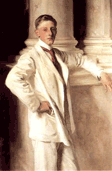It’s an odds-even bet whether Dr. Johnson got it right when he said, “Patriotism is the last resort of scoundrels,” or whether he should have said, “Patriotism is the first and last resort of scoundrels.” I say so as a person long oppressed by petty patriots and as a fugitive from this resort, first or last as it may be.
Two such scoundrels were Francis Bellamy and James Upham, partners in literary crime, who eyed greedily the upcoming anniversary celebrations for one Cristobal Colon back in 1892. Everyone in the
The words appeared on September 8, 1892, and within a mere month 12 million unwitting and innocent schoolchildren were required to mouth said words, the beginning stages of a ritual which would baffle and infuriate generations to follow. It was titled “The Pledge of Allegiance” in the zillions of cheapjack copies sent about the land, but since school children were always taught it by rote, they generally knew only the sounds of the concatenation of polysyllables that made it up. Its title seemed to be “pleja valejance,” and in its fullest, it sounded when recited as if it were something like Urdu, Double-Dutch or Ukrainian.
In its first incarnation, before legions of other busybodies got at it, the pleja read:
I pleja lejance to my flag
Unto the public for widgetstance,
One nation invisible
With libertine just as for all.
No schoolchild in the
By 1923, forces of premature political correctness (PC) had seized the pleja as a cause, adding words and phrases ostensibly to clarify it in the minds of its reciters:
I pleja lejance to the flag
Of the
Widgetstan,
One nation invisible
With libertine just as furrow.
This made many a youngster think of migration in search of political asylum. Even worse was on wing.
Just a year later, more meddlers noodled with the text, coming up with more “clarifications”:
I pleja lejance to the flag of the
Inundation invisible
With libertine just is furor.
It had reached a critical mass of obtuseness, cacophony and dissonance, or so thought many. But the future veered on toward us inexorably.
The earnest Xtians weighed in via Dwight D. Eisenhower, earthly surrogate of Daddy Warbucks, who signed a lot of pseudo-religious twaddle, now altering the sacred and inviolable text to:
I pleja lejance to the flag
Of the
One nation undue two gods
With libber, tea and juice for all.
This was the final crushing blow to the pleja that rendered it wholly unintelligible to any school-kid born after 1955 and made it possible for communist front organizations, hippy dope dealers and radical college students to weave the 1960s out of whole cloth. If only we had known we were saluting the flag! Pledging ourselves to it! Admiring and worshiping it! But no, the masterly obfuscation of Bellamy and Upham, abetted by the many skilful manglings of the Pleja-Amenders, left America helpless in the face of ravening hordes of liberals, free-thinkers and LSD-intoxicated no-hopers, which led us all like an arrow to Bill Clinton and that Wolinski woman and all that that entailed!
I grew up under Pleja No. 1, which my wee rural school had received in the distant past on yellowed sheets off-printed in 1892. From first to last, I was flummoxed, bamboozled and hornswoggled by its opacity, with no idea whatsoever of its meaning. When I ventured to ask my fifth-grade teacher, Miss Jackson, what it meant, I received only a glare and an admonition not to be uppity. Because Miss Jackson had both the profile and the stoic resolve of the Indian warrior depicted on the buffalo nickel, I never thereafter tried to question the Pleja. I bit the bullet and pretended, with all my peers, to understand and revere the Pleja as a daily wake-up call. Ignorance became my bliss.
This is a lesson from our history we must learn for once and all. There will never come again such deliverance as that promised us by the mystical pleja on that remote Columbus Day in the XIXth century. We must learn from the future lest we lose our firmest grip upon the past! ###
![]()
| jptHOME Issue 4 |
![]()
| Copyright 2007- WJ Schafer & WC Smith - All Rights Reserved |

| jptHome Issue 4 |
| jptArchives |
| The Journal of Provincial Thought |
